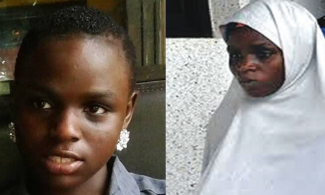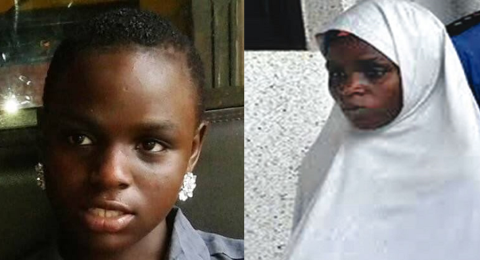
A quick proclamation by way of introduction: Ese Oruru, Patience Paul, and their parents are not the villains of the kidnapping and conversion of underage Christian girls in Northern Nigeria. Blaming the victim is a form of re-victimization, an exculpatory gimmick employed by those who, for reasons known only to themselves, do not want to confront or unequivocally condemn an egregious crime.

More instances of abduction, forced conversion and in some cases forced marriage of underage Christian girls have now come to light since the resolution of the Ese Oruru and Patience Paul cases. Ese’s case has opened a floodgate. Many cold cases, long-stalled in the labyrinth of law enforcement and legal inaction, are now in the public domain, resurrected by parents as the press and social media have become sensitized to this menace. As of today, there is an unresolved case in Zaria, one case in Zamfara State, and four cases in Bauchi State, the details of the latter appearing in Sunday’s edition of Punch Newspaper with pictures and interviews with parents, law enforcement, and the ubiquitous Sharia Commissions.
There should be no justifying the many wrongs that have been committed against these children and their parents by overzealous religious enforcers who have placed themselves above the legal and law enforcement institutions of the country. Some of these cases, in addition to the crimes of forceful conversion of and sexual assaults on a minor, are clear cases of kidnapping, a heinous offense under our penal code. Even in the case of Yunusa and Ese, clearly a 22 year old (his own father says he is 22) cannot have sexual relations with a 14 year old under Nigerian law. It is statutory rape of a child. A 14 year old is not at the age of sexual, romantic, and marital consent, period; so enough with all the specious mitigations of this egregious crime. Enough with the defensiveness.
Those of us who lived and schooled in the Muslim-majority states of the North know that these incidents have been going on for years. They are not outliers, as some people would want us to believe. Parents and pastors have been crying about these crimes for decades but very few cases actually made it to the national press. Starved of national press attention and without the democratized discursive space of today’s social media, many such cases were never resolved in favor of the children and their parents.
This is a time for a full accounting. Ese Oruru’s traumatic fate has opened a window onto a recurring violation of children and parental rights. It has given us an opportunity to address the underlying problems once and for all, instead of dealing only with the symptoms of a deep-rooted pathology.
These cases have one thing common: the overarching role of two entities in enabling these crimes and undermining the protection of children and the sanctity of the parent-child relationship.
The first villain is the Sharia Commission. These cases have revealed that these Commissions of unelected people (who are nestled in an institution with a nebulous remit and an undefined relationship to our legal and law enforcement institutions) have usurped the powers of the police and the legal system.
The Sharia Commissions have in each of these cases chosen the sides of abductors over the protection of the rights of the children and their parents. In each case the Commissions were too eager to win converts to Islam (quite contrary to mainstream Islamic consensus on the consenting age of conversion) to care about the wellbeing of the children, their parents’ rights, or the fact that adults may have sexually violated the minors.
These cases have revealed that the Sharia Commissions have placed themselves above both the police and traditional authorities. In both the Kano and Sokoto cases, the Sharia Commissions proved to be refuges for the abductors and defied the decisions of the emirate councils overruling the girls’ conversion and separation from their families. In the Ese Oruru case, the Sharia Commission disobeyed Emir Sanusi’s clear directive that Ese be returned to her parents.
The abductors are playing the Sharia Commissions like a pipe musical instrument. They dare not kidnap underage Muslim girls because they know that the Commissions would hold them liable for a crime that is clearly against Islamic law. Even if they did, they would not go the Commission if the parents cried out; they would not get sympathy or protection there. They target underage Christian girls and run to the Commission when challenged because they know that members of these Commissions would give them credit and protection for bringing people into the Muslim fold, for engaging in Da’wah, even if this entailed the violation of a child’s right.
But the Sharia Commissions are actively complicit in these crimes; they are not merely being manipulated into victimizing the girls. In the Sokoto, Kano, and Bauchi cases, the Sharia Commissions rejected the police directive that the girls be reunited with their parents.
This is a national embarrassment — the fact that an unelected body of individuals empowered to oversee and arbitrate the religious affairs of Muslims in a particular state is now more powerful than the Nigerian police and will not allow the police to do their constitutional job of protecting and enforcing the rights of Nigerian citizens and helpless minors wherever they are. This is de facto social federalism of the perverse kind.
This is a moment of truth for the country. Do we want to be a modern, secular nation, or one where secular state institutions enshrined in the constitution are subordinated to the whims of parochial institutions established by states to supervise the interest of one out of Nigeria’s three religious communities?
Either we have a nation or we don’t. Either we have a police institution or we don’t. Either we have enforceable laws and rights or we don’t. Either we have a judiciary capable of adjudicating cases between people of different religions or we don’t. The role of the Sharia Commissions is now clearly in conflict with the constitutional role of the police and the judiciary.
The Sharia Commissions have outgrown their original remit and have now supplanted law enforcement and the judiciary. Their role must be defined and the limits of their jurisdictions properly delineated. Their usurpation of secular police and judicial functions has to be checked.
The other villain in this story is the police. They have not exactly covered themselves in glory in their responses to these incidents. In all the cases, the police proved powerless to confront the impunity of the Sharia Commissions, paralyzed in the face of the belligerent postures of the Commissions.
The police also seemed, in all the cases, to regard the complaints of the parents as nuisances. They would not on their own do what they are empowered by the constitution to do: free abducted children and prosecute the perpetrators. They would not protect vulnerable children pried away from their traumatized parents. Even when emirate councils authorized them to reunite the children with their parents, they inexplicably would not do that, deferring to the seemingly omnipotent Sharia Commissions.
It is a national shame. If violated children and their parents cannot rely on the police to secure their freedom then what are the police good for? In one of the Bauchi cases, the police commissioner himself, who was part of a negotiation, allowed the girl’s abductors to defy his authority and return to their home with their captive even as her parents pleaded that their daughter, who was right there, should be released to them. No arrest, no rescue.
From what we have read, the traditional institutions did the right thing in the cases of Ese Oruru and Patience Paul. They reported the matter to the police and overruled those who wanted to use the ruse of religious conversion to appeal to the religious emotions of the emirate/sultanate. The criticism of these institutions is thus undeserved in my opinion.
The police failed the girls and their parents despite the effort of the traditional institutions to do the right thing. The Sharia Commissions were complicit in the crimes. Their staff who continued to detain the girls in defiance of orders issued by the traditional institutions and the police ought to be prosecuted for enabling kidnap, forceful conversion, and sexual assault.
It is saddening that these serious crimes have been sucked into Nigeria’s familiar ethno-religious debates, stereotyping, and bickering. The victims, those recued and those still in captivity, deserve better.
Their ordeal has opened an avenue to have a constructive conversation about child rights, about the abuse of girl children, and about the deployment of religious sentimentality and zealotry to enslave and victimize children. The same dubious use of religion to oppress children is rampant in Pentecostal Christian circles, where vulnerable children are serially accused of witchcraft and are physically abused or cast away to ostensibly rid community of evil spiritual spells.
It has also been disheartening to see a legitimate complaint about a widespread problem turned into the familiar bashing of Northern Nigerian Muslim culture. For the record, the north is not as insular as many Southerners assume it to be — not in religious terms and not in ethnic and cultural terms. It is a remarkably diverse region. Many ethnic groups and families in the North have adherents of both Islam and Christianity.
Contrary to what one might believe, interreligious marriage is fairly common in the north, although not encouraged. And couples are rarely harmed for entering into such marriages. In fact some Muslims in the region marry Christians and allow their wives to continue to attend church as Islam does not compel husbands to convert their wives. And some Christians marry Muslims. There is a long history of marital crossing of religious lines in the north. I have in my possession colonial records from close to a hundred years ago in which colonial authorities debated what to do about consensual interreligious marriages in the north.
In many parts of the North, including some areas in the Muslim-majority states of the Northwest, Christians and Muslims are deeply comingled as my friend Shobana Shankar’s book, Who Shall Enter Paradise, shows. This interdependence makes cohabitation and intermarriage inevitable. It also makes conversion from one religion to the other fairly common, with few negative repercussions — again contrary to what many people believe.
In some sense, then, the menace of these kidnap-and-convert incidents involving underage Christian girls is galling precisely because it is new and departs radically from the familiar historical patterns of relations between proximate Muslims and Christians in the region. It must be understood as an offshoot of the over-politicization of the religious space in Northern Nigeria, a fairly recent phenomenon.
These child abduction and conversion incidents should thus not be advanced to perpetuate the myth that adherents of the two religions do not mingle positively or that their relations are only marked by conflict and crimes of the type committed against the girls.
Ochonu can be reached at [email protected]